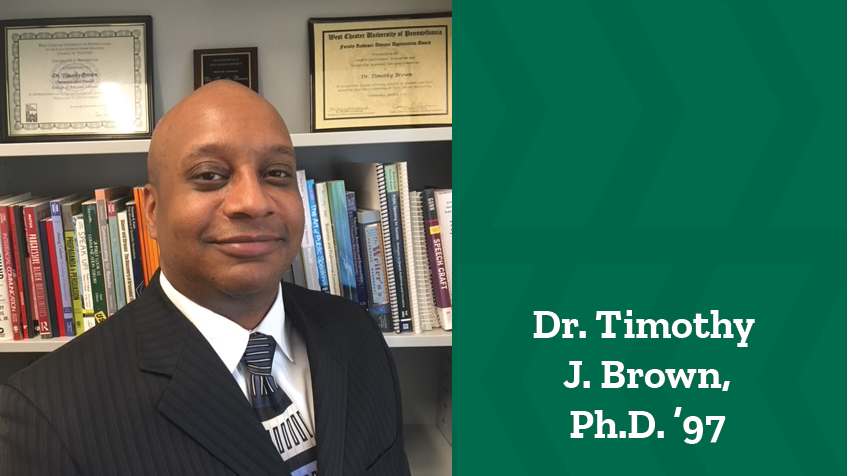Alumnus Spotlight - Dr. Timothy J. Brown, Ph.D. '97
Name: Timothy J. Brown
Hometown: Coatesville, Penn.
Year Graduated: 1997 – Ph.D.
School: InCo (Interpersonal Communication, now Communication Studies)
Major: Rhetoric and Public Address
Current job title and location: Dean of the James L. Knight School of Communication, Queens University of Charlotte (Charlotte, N.C.)
What do you do? I oversee the school’s faculty and staff, in addition to, the curriculum, policies, program development and resource allocation for the Knight School of Communication at Queens University of Charlotte. Our school is the only communication program in the nation endowed by the Knight Foundation.
Tell us about your career path. My career path was improbable. I was a first-generation college student who ended up on academic probation after my first semester at West Chester University (WCU). I would rebound to graduate with my B. A. in Communication Studies and take my first job as a sports reporter for my hometown newspaper. I was recruited back to WCU for my Master’s degree by the department chair of the Department of Communication Studies. I was a graduate assistant for WCU’s Forensics Team, which was influential in me enrolling at Ohio University for my Ph.D. as I would become a graduate assistant for Ohio’s Forensics Team.
I graduated from Ohio University in 1997 and accepted my first faculty position at Buffalo State College. In 2002, I was recruited back to West Chester University by the same department chair who encouraged me to go to graduate school. After five years, I succeeded the same chair as the new chair. At the time, I became the boss of many of the professors who I had as an undergraduate student. After 10 years of serving as chair, I was recruited to the dean position for the Knight School of Communication at Queens University of Charlotte.
What made you come to Ohio University? Were there other places you considered? What brought me to Ohio University was the opportunity to complete my Ph.D. by continuing my work in forensics (speech and debate). When I was the graduate assistant for the West Chester University’s Forensics team, we would compete against Ohio University’s team at various tournaments. The directors of the programs knew one another, which led to my introduction to OHIO. Once I visited Ohio University, I really liked the faculty and students, which led to my decision to attend Ohio University.
I did have two other schools on my list but Ohio University was a much better fit.
How did the Scripps College of Communication equip you with the skills you needed to succeed? I really learned how to become a faculty member from working and learning from the faculty at Ohio University. By having the opportunity to teach and to conduct research, I learned from the faculty how to become an effective teacher/scholar. And the mentoring I received was priceless! The faculty were always approachable and available. I have used what I have learned from the faculty at Ohio University in each position I have held.
What about your experiences here was so memorable? I have many memories of the people. The most important would be my wife, Laura, who I met when we were both enrolled in Ohio University’s graduate program. We were married in 1996. I remember when we returned from the summer break for my final year, the director at the time, Dr. Sue DeWine, gave us a bouquet of flowers at the opening meeting.
Also, I have very fond memories of my weekly dissertation meetings that I would have with my advisor Dr. J.W. Smith at Miller’s Chicken. The food, the conversation, the laughter—it was mentoring at its best! I still use Dr. Smith’s philosophy when working with graduate students, “The best dissertation is a done dissertation!”
What advice do you have for current students? My advice is simple but I think it still holds true—complete tasks in excellence, show initiative and commitment, be responsible and professional, and communicate effectively. Be the person whose company people enjoy. Skills can be taught but dispositions can’t. Each job, task, or endeavor is an opportunity for you to make a connection and to network. When you give your best effort every day, it sets you up for the next opportunity.
